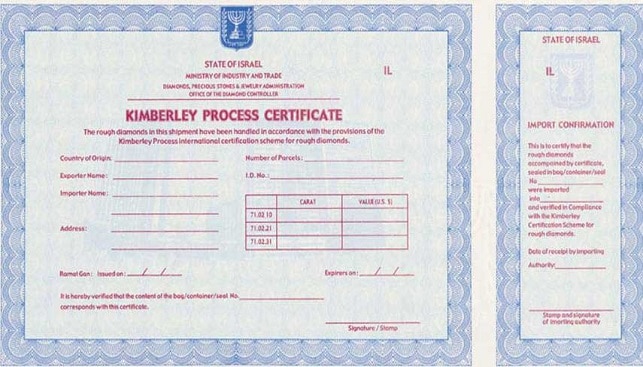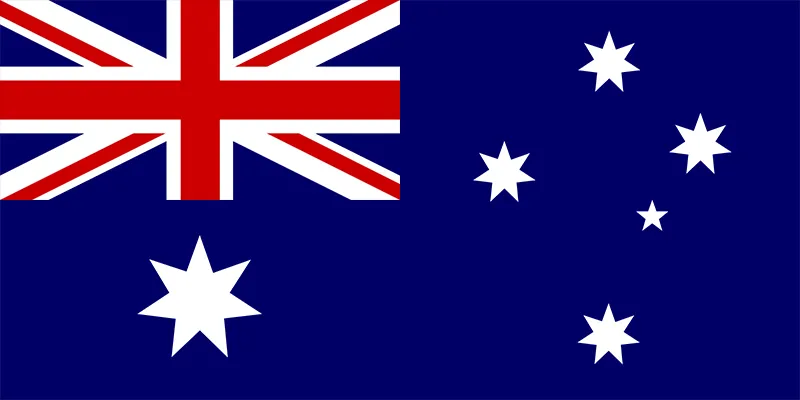Kimberley process certification 7 Fundamentals.

The Kimberley Process Certification Scheme (KPCS) is an international initiative aimed at preventing the trade of conflict diamonds. Here are 7 key points about the Kimberley Process Certification:
- Origin and Purpose: Established in 2003 to regulate the diamond industry and prevent the trade of diamonds that finance armed conflicts and human rights abuses.
- Scope: The KPCS operates in over 80 countries, including diamond-producing, trading, and manufacturing nations, to ensure the integrity of the diamond supply chain.
- Certification Process: The process involves a series of requirements and measures to track diamonds from their origination to the final consumer. Each diamond is accompanied by a certificate that verifies its conflict-free status.
- Conflict-Free Definition: Process defines conflict diamonds as “rough diamonds used by rebel movements or their allies to finance armed conflicts against legitimate governments.”
- Government and Industry Collaboration: The success of the KP relies on cooperation between governments, industry players, and civil society organizations. They work collectively to implement and enforce the necessary controls and regulations.
- Monitoring and Review: Regular monitoring and review mechanisms are in place to ensure compliance with the KP requirements. Participants are subject to both peer and external reviews to assess their adherence to the guidelines.
- Impact: Since its establishment, the Kimberley Process has significantly reduced the trade of conflict diamonds globally, enabling consumers to have greater confidence that the diamonds they purchase are ethically sourced.

The Kimberley Process Certification plays a vital role in promoting transparency and accountability in the diamond industry, ensuring that consumers can enjoy the beauty of diamonds with peace of mind.

How to Obtain a Kimberley Process Certification Certificate
The Kimberley Process Certification Scheme (KPCS) plays a vital role in preventing the trade of conflict diamonds. If you are interested in buying a KP Certification Certificate, it’s important to understand the process and the entities involved.
What is the Kimberley Process Certification Scheme?
The Kimberley Process (KP) is an international diamond certification scheme established in 2003. Its main objective is to halt the trade of rough diamonds that fund armed conflict, thereby promoting ethical and sustainable practices in the diamond industry. The KPCS requires diamond-producing countries to implement strict monitoring mechanisms to ensure that diamonds being exported are conflict-free.
Steps to Buy a Kimberley Process Certification Certificate
- Identify the Authorized KP Authority: The first step is to determine which organization or body is authorized to issue KP Certification Certificates in your country. In most countries, this responsibility falls under the Ministry of Mines, mining departments, or designated government authorities. Conduct thorough research to find the specific organization relevant to your location.
- Contact the Authorized KP Authority: Once you have identified the authorized body, reach out to them to understand the application process. It’s important to note that individuals cannot directly purchase KP Certification Certificates. Rather, it is the responsibility of the diamond exporting companies to obtain this certification for their shipments.
- Engage in the Diamond Trade: To obtain the KP Certificate, you need to be actively involved in the diamond trade. This means you should either establish your own diamond trading company or collaborate with an existing one. Ensure that you adhere to all local and international regulations regarding diamond trading.
- Comply with KPCS Standards: The KPCS has specific requirements for diamond traders, including record keeping, use of tamper-resistant containers, and strict adherence to exporting and importing guidelines. Work closely with the authorized KP Authority to understand and fulfill these requirements.
- Apply for Certification: Once you have met all the necessary criteria outlined by the authorized KP Authority, submit an application for KP Certification. This involves providing detailed information about your company, your business practices, and the diamonds you intend to trade. You may also need to pay a fee to cover the certification process.
- Evaluation and Approval: The KP Authority will review your application, conduct inspections if necessary, and evaluate your compliance with the KPCS standards.
What is the Kimberley process certification scheme for rough diamonds?
The Kimberley Process Certification Scheme (KPCS) is an international initiative established in 2003 to prevent the trade of conflict diamonds. Conflict diamonds, also known as blood diamonds, are rough diamonds that are used by rebel groups to finance armed conflict against legitimate governments. The KPCS sets guidelines and regulations for the certification of rough diamonds to ensure that they are sourced from conflict-free areas.
Under the KPCS, participating countries must enact legislation and implement internal controls to trace and certify the origin of rough diamonds. The scheme requires diamond-producing countries to issue Kimberley Process Certificates for each shipment of rough diamonds exported, stating that they are conflict-free. Importing countries must verify the legitimacy of the certificates and ensure that the diamonds they receive are from approved sources.
By establishing a transparent and traceable supply chain, the Kimberley Process aims to prevent conflict diamonds from entering the legitimate diamond trade and to promote ethical practices in the diamond industry. It has been successful in significantly reducing the trade of conflict diamonds and promoting responsible sourcing practices globally.
Kimberley process rough diamond statistics website
To obtain exclusive information, you can visit the official Kimberley Process website at https://www.kimberleyprocess.com/.
Who are the 55 Kimberley process members?

The Kimberley Process (KP) is an international initiative established to prevent the trade of conflict diamonds. It consists of governments, industry representatives, and civil society organizations. As of September 2021, the Kimberley Process has 55 members, including:
- Australia
- Belgium
- Botswana
- Brazil
- Cambodia
- Cameroon
- Canada
- Central African Republic
- China
- Congo, Democratic Republic of the
- Congo, Republic of the
- Côte d’Ivoire
- Czech Republic
- European Union
- Gabon
- Ghana
- Guinea
- Guyana
- India
- Indonesia
- Israel
- Japan
- Kazakhstan
- Korea, Republic of
- Laos
- Lebanon
- Lesotho
- Liberia
- Malaysia
- Mauritius
- Mexico
- Namibia
- New Zealand
- Niger
- Norway
- Panama
- Philippines
- Qatar
- Russia
- Sierra Leone
- Singapore
- South Africa
- Sri Lanka
- Sudan
- Switzerland
- Tanzania
- Thailand
- Togo
- Trinidad and Tobago
- United Arab Emirates
- United States of America
- Venezuela
- Vietnam
- Zambia
- Zimbabwe
These countries, along with their respective industry and civil society representatives, work together to ensure that the diamond trade is free from conflict and helps support sustainable development.

Who are the 5 Kimberley process participants?
The Kimberley Process is an international initiative aimed at preventing the trade of conflict diamonds. It involves various participants who play different roles in ensuring the legitimacy and ethical sourcing of diamonds. The main participants in the Kimberley Process are:
- Governments: The governments of participating countries are responsible for implementing the Kimberley Process Certification Scheme (KPCS) within their territories.
- Diamond Industry: This includes diamond mining companies, diamond traders, and diamond manufacturers who are involved in the production and trade of rough diamonds.
- Civil Society Organizations: These organizations represent the interests of non-governmental entities and help ensure transparency and accountability in the diamond industry.
- Inter-Governmental Organizations: These organizations provide support, guidance, and facilitate communication among the participating countries in the Kimberley Process. Examples include the United Nations and World Customs Organization.
- Rough Diamond Valuation Experts: These professionals assess and determine the value of rough diamonds to ensure fair pricing and prevent illicit trade.
By working together, these participants strive to prevent the trade of conflict diamonds, promote responsible diamond sourcing, and contribute to the sustainable development of the diamond industry.

KIMBERLEY PROCESS COMMUNIQUE’ FOR THE HYBRID PLENARY MEETING
HELD IN (GABORONE, BOTSWANA) ON 1-4 NOVEMBER 2022
1. The Eighteenth Kimberley Process (KP) Plenary Meeting was convened under the
Chairmanship of the Republic of Botswana from the 1-4 November 2022, in a hybrid
format. The in-person meetings were held in Gaborone, Botswana.
2. With its primary objective being the prevention of the flow of conflict diamonds,
while helping to protect legitimate trade in rough diamonds, the KP remains till this
day a unique tripartite initiative that brings together stakeholders in Government,
the industry and civil society coalition in its quest to prevent conflict diamonds from
entering the diamond trade.
3. The Kimberley Process has proven to be an effective multilateral tool for conflict
prevention by stemming the flow of conflict diamonds. It has had valuable
developmental impact in improving the lives of people in some diamond mining
communities and contributing to the achievement of the UN Sustainable
Development Goals as espoused in Agenda 2030.
4. The 2022 Plenary saw the participation of the Kimberley Process tripartite,
represented by governments, industry and civil society. For the 2022 Plenary held
in Gaborone, 52 Participants, 2 Observers, and 2 Independent Observers registered
and attended the meeting. The Plenary appreciated the efforts of the Republic of
Botswana in promoting the continuation of work in a hybrid format as it allowed
flexibility, inclusiveness, transparency for Participants and Observers who could not
travel.
5. Participants and Observers thanked the Republic of Botswana for its leadership in
2022 and welcomed the Republic of Zimbabwe as incoming KP Chair for 2023.